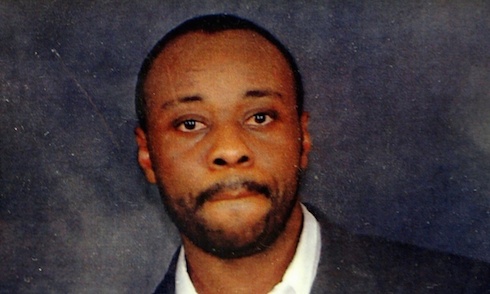Jimmy Mubenga and the "outsourcing of violence"—By Antony Lowenstein

Jimmy Mubenga died of cardiac arrest whilst waiting to be deported on board an Angola-bound plane at Heathrow airport on 12 October 2010. Fellow passengers heard Mubenga scream, “I can’t breathe” as he was restrained and pinned down in his seat. G4S guards forced his head down and restricted his breathing, despite Mubenga already being handcuffed from behind.
On 16 December 2014, three G4S guards were found not guilty of manslaughter. This Black History Month, we remember Jimmy Mubenga and publish an extract from Antony Loewenstein's Disaster Capitalism exposing the institutional racism that acquitted Mubenga's killers, and the government-approved, corporate unaccountability that means G4S still secures massive contracts, earning £6.8 billion last year.
"Racism had become endemic within an economic system that produced dehumanization while suppressing transparency and neglecting proper training."
Photograph: Guardian, Graeme Robertson
Jimmy Mubenga was an Angolan man killed by G4S on a British Airways flight in 2010 as he was being deported from Britain. Three G4S guards were charged with manslaughter and acquitted, despite evidence emerging at their 2014 trial that they had forcibly held Mubenga down while he screamed: “I can’t breathe.” G4S whistle-blowers told a Home Office committee after Mubenga’s death that the company routinely hired individuals who were not trained appropriately, or who showed insensitivity towards vulnerable detainees. The potentially lethal technique used to restrain Mubenga had been flagged as dangerous, but this had been ignored by management. Other deportees also complained of rough handling by G4S employees, including a Zimbabwean man who alleged that he had been punched and kicked while handcuffed and wearing leg locks.
The Mubenga case was a perfect example of corporate unaccountability. At the end of the 2014 trial, Mubenga’s widow, Adrienne Makenda Kambana, pledged to pressure the Home Office “to make sure there is an independent monitor on each deportation so they can observe what is going on. I can’t stand by and watch this happen to another family. I have to do that for Jimmy.” After four years of investigations and public shaming of G4S, Amnesty International commented that it was still impossible to “know which of these [dangerous restraint techniques] are still being used today or if the UK government has actually delivered on its promise to introduce new and safer methods and training. Once again a migrant has lost their life in detention, and once again no one will ultimately be held to account.”
At the heart of this tragedy was the role of G4S and its hiring practices. Although, at the 2014 trial, text messages from the guards had inexplicably been deemed not to have “any real relevance”—as was the testimony of a whistle-blower who told an earlier inquiry that a form of banned restraint known as “carpet karaoke” was used to forcibly restrain Mubenga and push his head down—two of the three defendants had sent dozens of messages that displayed hatred towards Muslims, Asians, and Africans. One of the guards, Stuart Tribelnig, 39, had written: “Fuck off and go home you free-loading, benefit grabbing, kid producing, violent, non-English speaking cock suckers and take those hairy faced, sandal wearing, bomb making, goat fucking, smelly rag head bastards with you.” (Photograph: Guardian, Lauren Hurley. Terrence Hughes had 76 texts on his phone in which he abused Africans, Asians and Muslims. He was acquitted of killing Jimmy Mubenga)
(Photograph: Guardian, Lauren Hurley. Terrence Hughes had 76 texts on his phone in which he abused Africans, Asians and Muslims. He was acquitted of killing Jimmy Mubenga)
With so many cases of G4S having hired racist employees, and report after report having found that the company had employed a disproportionate number of staff who displayed a callous disregard for people of color, it was reasonable to ask why the firm was not charged with corporate manslaughter when a person died in its care.
Racism had become endemic within an economic system that produced dehumanization while suppressing transparency and neglecting proper training. An anonymous account of a Serco guard working at the remote Curtin detention center, in Western Australia, explained: “If you start off a bit of a cunt when you arrive, you’re a major cunt by the time you leave.” As for the G4S guards hired to transport Mubenga, poorly vetted and intolerant, an aggressive attitude and a contempt for non-whites was often a prerequisite. Although guards dealt every day with the most vulnerable members of the community, they were, the Australian guard said, there because they “need[ed] a job that will last a few months, pay well, employ immediately, and requires no expertise.”
Mubenga’s coroner, Karon Monaghan QC, understood what outsourcing meant in reality. In a far more humane assessment of the case in 2013, which forced a criminal trial after the initial inaction of the Crown Prosecution Service, Monaghan wrote, after reading the racist texts, that “the potential impact on detainees of a racist culture is that detainees and deportees are not ‘personalized.’” The sheer scale of the problem, exacerbated by years of state inaction, was revealed in a 2015 Institute of Race Relations report, Dying for Justice, identifying Mubenga as one of over 500 minority individuals who had died after an interaction with the police, prison, or immigration services, or one of their privatized proxies, since 1991.
Read more about #BlackLiberation on the Verso blog.
Disaster Capitalism by Antony Loewenstein is 50% off until the end of December with free shipping worldwide.